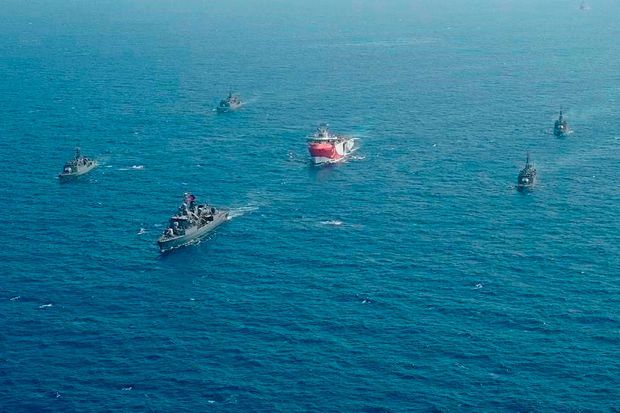Turkish research vessel Oruc Reis, centre, is surrounded by navy vessels as it heads west of Antalya, in the Mediterranean Sea, on Aug. 10, 2020.
Turkey vowed Tuesday to press ahead with searching for oil and gas in the eastern Mediterranean Sea, saying it plans to issue new exploration licenses for the area despite an escalating dispute with Greece over drilling rights.
The Greek government, meanwhile, was calling for an emergency meeting of the European Union’s Foreign Affairs Council on the situation.
Tension remained high between NATO allies Greece and Turkey, both of which have warships shadowing a Turkish research vessel that was sent to carry out seismic research for energy resources in an area Greece says is on its continental shelf.
Turkish Foreign Minister Mevlut Cavusoglu said Turkey planned to conduct search operations “on the western edges” of Turkey’s continental shelf. He said the work would be done on behalf of both Turkey and Turks in ethnically divided Cyprus, which also has objected to Ankara’s exploration activities.
“We are fully determined to continue our seismic research and drilling efforts,” Cavusoglu said during a joint news conference with his visiting Azerbaijani counterpart. “We will defend to the end the rights of Turkey and of Turkish Cypriots in the Eastern Mediterranean and in Cyprus, and we will make no concessions.”
The Turkish government announced on Monday that its research vessel Oruc Reis and two support vessels would be operating in the Mediterranean Sea between Cyprus and Greece until Aug. 23. The vessel arrived in the area Monday morning, escorted by Turkish warships.
Greece slammed the decision as an illegal act that infringed on its sovereign rights, saying the Turkish research vessel was inside an area covered by the Greek continental shelf. Greek warships were in the area and were monitoring the Oruc Reis, and the military was on alert, officials said.
Greek Prime Minister Kyriakos Mitsotakis’s office said the country’s foreign minister be requesting an emergency meeting of the European Union’s foreign affairs ministers.
The spokesman for the EU’s executive arm, Peter Stano, said such requests were “always an issue of consultations among the member states” and that the appeal would be reviewed once Greece makes a formal request.
“We agree that the situation in the eastern Mediterranean is extremely worrying and needs to be solved in dialogue and not in a series and sequence of steps that are increasing the escalation and the tension,” Stano said.
Omer Celik, the spokesman for Turkish President Recep Tayyip Erdogan’s ruling party, criticized Athens for calling on the EU.
“As usual, Greece has called the European Union to a meeting to support its unfair, unlawful and aggressive policies,” Celik said on Twitter. “The European Union should not allow Greece to turn the whole of Europe into a `Greek theatre,”’ he said on Twitter.
Greece and Turkey have traditionally had testy relations and have been at odds for decades over a wide variety of issues. The two have come to the brink of war three times since the mid-1970s, including once over drilling exploration rights. Recent discoveries of natural gas and drilling plans across the east Mediterranean have led to renewed tension.
Cavusoglu said Turkey last month had agreed to halt its search efforts in the region “as a gesture” following the intercession of the EU and Germany but that Greece did not respond “in a positive way.”
“No one can accuse Turkey of not displaying goodwill, but on the opposite side, there is a country with bad intentions. If they are to blame anyone, they must blame Greece,” Cavusoglu said.
Ankara was angered by a deal Greece signed with Egypt last Thursday delineating their bilateral maritime boundaries and exclusive economic zones for rights to the exploitation of resources.
Last year, Turkey signed a similar deal with the UN-backed Libyan government in Tripoli, sparking outrage in Greece, Egypt and Cyprus, which said the agreement infringed on their economic rights in the Mediterranean. The EU said the deal was a violation of international law that threatened regional stability.
At the heart of the issue is how a country’s continental shelf is calculated and whether islands should be included in the calculation. Turkey argues they should not, a position that Greece says violates international law.
Source: Globe and Mail



